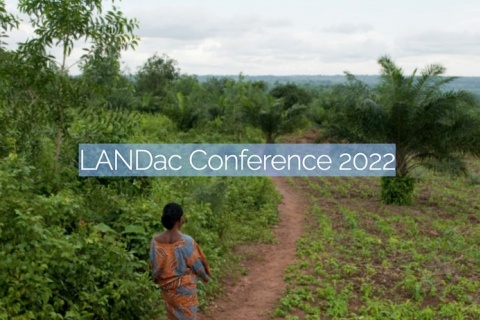Good Land Governance is a governance system that aims to protect the property rights of individuals and enterprises based on following good governance principles like accountability, transparency, the rule of law, effectiveness, efficiency, equality and public participation.
In Cameroon, many rural communities are unaware of their rights, in a context where they are increasingly challenged by large-scale land-based investments. Sandrine Kouba from RELUFA explains how setting up a radio programme has helped to inform indigenous communities about their rights and enable them to feel better prepared to face investors.
The 13th Annual LANDac Annual Conference is taking place in person next week in Utrecht, Netherlands, for the first time since the COVID-19 pandemic began. All the conference sessions will also be accessible online to registered participants. LANDac brings together land governance stakeholders from around the world who might not otherwise meet, including academic researchers, the private, civil society, and policy makers.
Three new case studies show: In the context of large-scale land investments in Africa, human rights violations and social as well as environmental damages are the rule, not the exception. The message of the studies is therefore clear: development banks and their governments must do more for human rights and take responsibility for damages caused.
When the US housing bubble burst in late 2008, it dragged major banks into liquidation and destabilised financial systems worldwide. A long, era-defining recession ensued, ushering bank bailouts, currency crises and austerity measures. Meanwhile, China’s skyrocketing industrial production was shifting global economic power.
Click here to view the data story in a separate window.
This panel took a critical look at the land governance orthodoxy that has consolidated on the heels of the financial crisis and outcry over "global land grabs" at the end of the 2000s. The panel began with a presentation on the “theory of change” guiding land governance interventions, profiling how the global development establishment has deployed the concept of “tenure (in)security” to advance the formalization of property rights through individual, transferrable title – claiming this will empower women and reduce poverty by providing incentives to invest, enhancing access to credit, increasing production and reducing conflict.
The LANDac Conference 2021 was opened by the Co-Chairs of LANDac, Dr. Gemma van der Haar from Wageningen University and Dr. Guus van Westen from Utrecht University. Dr. Guus van Westen noted that theirs is the 11th consecutive LANDac conference, and that last year, labeling the conference an Online Encounter, we were not yet ready to accept the new reality of COVID-19. This shift has enabled LANDac to reach new audiences that were not previously part of the LANDac crowd.
By Nilesh Kunwar
Originally posted by Eurasia Review at: https://www.eurasiareview.com/03052021-pakistans-biggest-land-grabber-oped/
Photo: Pakistan's General Qamar Javed Bajwa
The data revolution – characterised by the transition to big data, open data and new digital data infrastructures [1] – is projected to make an astonishing 44 billion terabytes of digital data and information available by the end of 2020 [2]. Despite this plethora of information now available to us, about 1 billion people in 140 countries still feel insecure about their land and property rights [3].
The Parliament of South Africa has agreed to amend the Constitution of the country in order to make it explicit that it is possible to expropriate land without paying compensation in order to further land reforms. The supporters of this move - the ruling African National Congress (ANC) and the opposition Economic Freedom Fighters (EFF) – argue that this is necessary to speed up land reforms in order to overcome the continuing extreme and still largely racially defined inequalities in land ownership.
Next week the Conference on Land Policy in Africa - Winning the Fight against Corruption in the Land Sector: Sustainable Pathway for Africa’s Transformation, will take place in Abidjan. The African Union recognises that corruption is a key factor hampering efforts at promoting governance, socio-economic transformation, peace and security, and the enjoyment of human rights in the Member States.




















